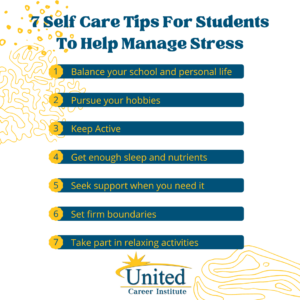Completing your post-secondary education can be a stressful experience for anyone. You likely experience many stressful experiences and will never be able to eliminate stress from your life entirely. Thankfully, stress can be managed, and United Career Institute is here to provide you with 7 self-care tips to help you care for yourself and limit your stress.
1.) Strike A Balance Between Your School And Personal Life
Our first tip is to balance your school life with your personal life successfully. If you let one overwhelm the other, it can generate unneeded stress. This is why it is crucial to strike a balance between the two. We have an entire blog filled with tips to help you successfully balance your school and personal life.

2.) Discover Your Hobbies
When stressful situations arise, it may seem like you need to stop doing everything else to complete the current task. However, this is not always the case. Taking a short break to pursue one of your hobbies or find a new one can be a great destresser. This break will provide you with enjoyment and help you clear your mind from your stressors.
That said, it is important to ensure you do not become so enthralled with your hobby that you lose track of time. You must still complete that task, whether homework, studying for a test, or something completely unrelated to school. An excellent way to ensure you don’t spend too much time distracted is to set a timer to prevent you from losing track of time.
3.) Keep Active
Another tip is to keep active. This can be something as simple as taking a walk, or it can be a complete workout. According to the Mayo Clinic, exercise can increase your endorphins and reduce the adverse effects of stress. When combined, these can help improve your overall mood.
4.) Make Sure To Get Enough Sleep And Nutrients
One of the tips we stress the most is to ensure you get enough sleep and eat enough nutrients. According to WebMD, adults, on average, should be getting anywhere from 7 to 9 hours of sleep a night, but some could need as much as 10 hours of sleep. If you do not get enough sleep, you can be subject to the mood changes that come from sleep deprivation.
Also, ensure you eat enough food, as sleep is only part of the equation. Starting the day with a good meal will give you the necessary nutrients and energy to help you get through the day. If you feel tired or low on energy, it will make completing your work a lot harder. As a result, you prolong the time you feel stressed.
5.) Seek Support When You Need It
It is okay to seek support if you begin to feel overwhelmed. This can come in many forms; you can schedule an appointment with a therapist or find a trusted friend or family member to talk to. Sometimes, hearing a perspective other than your own can help create a solution.
6.) Set Firm Boundaries
Another tip we offer is to set firm boundaries. It is important to not mistake this for being able not to complete prior commitments. However, if someone asks you to do something additional, it is entirely okay to say no because you have to complete some work. Overloading your schedule will increase your stress, so it is vital that you know your limits.
7.) Take Part In Relaxing Activities
Similarly to pursuing your hobbies, taking part in relaxing activities can also help manage stress. Relaxing activities can help keep you calm and prevent you from being overwhelmed. Furthermore, they can also serve as a temporary distraction. Once again, it is crucial that you set timers to ensure that you do not lose track of time. Ultimately, what people find relaxing is somewhat subjective, but here are a few examples.
Meditate
The Mayo Clinic states that meditation is a quick and easy way to reduce stress. Meditation is very accessible as it requires no special equipment. If you feel yourself starting to be overwhelmed by stress, you can meditate anywhere and anytime. As you meditate, you can gain better control over your emotions, which can help you navigate future stressful experiences.
Listen To Music
Michigan State University writes that music reduces stress, promotes healing, and can improve one’s overall emotional well-being. Music can stimulate the production of dopamine. Outside the health benefits, you can listen to music while you work. Unlike other activities, music allows you to relax while doing some work.
Yoga
In an article from the American Osteopathic Association, one of yoga’s most significant benefits is that it can help reduce stress and overall well-being. It can also help develop coping skills, which could reduce the effects of stress in the future. Additionally, there are tons of physical benefits.
Continue Your Education At United Career Institute
Begin your future at United Career Institute today by exploring our Practical Nursing, Phlebotomy, Medical Coding, Clinical Medical Assistant, Medical Office Administration, Medical Assisting, and Medical Billing/Administration programs. Reach out by calling the admissions office at 724-515-2440 or Requesting Information today!
